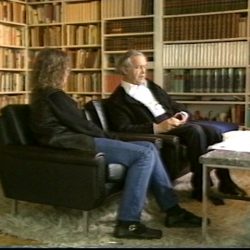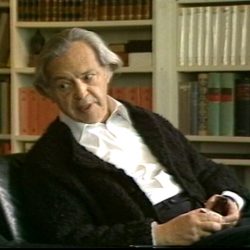A video documentation of the performance concert archive burn out, filmed and edited by Freya Hattenberger on 10th April in the Nazi Documentation Centre, Cologne, with “Suspended Beliefs”, poetry and textwith improvised music: Tanya Ury (voice), Gernot Bogumil (trumpet), Kasander Nilist (double bass), Hans Salz (percussion), can be seen here: Documentation: 46:06 minutes: vimeo.com/112831445 Trailer: 6:51 minutes: vimeo.com/112828403 … 8:30 minutes: vimeo.com/112828985
Tanya Ury has developed archive burn out, a spoken text, to be presented together with the improvising musicians of Suspended Beliefs: Gernot Bogumil trumpet, Kasander Nilist double bass, Hans Salz percussion. Each of four parts: the gatherers, the library, anti gone and burn out depict various stages in the development and eventual collapse of an archive. The inclusion of a video-clip about the book burning in 1933 by the Nazis, in the context of this piece that references the collapse of the Historical Archive of the City of Cologne, five years after it’s occurrence, connects the two events.
The improvised music keeps to a structure that integrates various concepts – an African rhythm of the Ewe people is recreated for example. East Asian sounds are also created with a pentatonic scale. Jazz-like and the more abstract sounds of new music, as well as a chorale-like element, form part of the improvised score, to suggest diversity and inclusion, in the accumulation of an archive, before it fails because of censorship or carelessness.
If Freud suffered from mal d’archive, if his case stems from a trouble de l’archive, he is not without his place, simultaneously, in the archive fever or disorder we are experiencing today, concerning its lightest symptoms or the great holocaustic tragedies of our modern history and historiography: concerning all the detestable revisionisms, as well as the most legitimate, necessary, and courageous rewritings of history.
P. 90 “Archive Fever – A Freudian Impression”, Jacques Derrida 1994, The University of Chicago Press 1996 ISBN: 0−226−14367−8
Within the mind and body, a person carries a covert, personal library that includes genetic memory and the subconscious. An archive likewise may be more than the sum of its collected parts when in between the lines (the walls of shelves), the subordinate’s voice is somehow incorporated into the museum’s body, as oral history, for instance – not walled in and forgotten (anti gone). Tanya Ury’s piece archive burn out makes a case for the reinstatement of the hidden or excluded.
Integrated into the piece are quotations from, amongst other things:
“Wir bauen eine Stadt”, Kinderoper, Paul Hindemith 1930
“The Story of General Dann and Mara’s Daughter, Griot and the Snow Dog”, Doris Lessing, 2005
“The Post Card – From Socrates to Freud and Beyond”, Jacques Derrida 1987
“Archive Fever: A Freudian Impression”, Jacques Derrida 1995
“Fahrenheit 451”, Ray Bradbury 1953, the film by François Truffaut in 1966
“The Emigrants”, W.G. Sebald, 1992
And from Elfriede Jelinek’s email correspondence with Joachim Lux, in the programme notes for „Das Werk“ (The Works), Burgtheater, 2002/2003.
***
A hegemonic power may demonstrate its ruthless will, when fractions of a society’s established history are simply eliminated or disregarded. Whether it happens by chance, as in Alexandria of 48 BCE — legend has it that Julius Caesar accidentally burned down the Ancient Library, the largest in the ancient world, during a conflict with Achillas; or by strategy – the Armenian genocide of 1915 is still officially being denied in Turkey today; by intrigue — with the effacement of certain, no longer wished for facts of historical knowledge, as in Soviet Russia of 1929, when Stalin removed images of Trotsky and other politicians from official photographs (they were considered enemies of the people after questioning Stalin’s dictatorial rule); or as in Germany under the Nazis, when a great part of the cultural legacy was symbolically destroyed with the book burning, of so-called degenerate writing, in 1933.
In all these cases, the significance of a minority culture or aspects of a history that ruling powers seek to bury is undermined — even in the case of Alexandria, a conquering army’s lack of awareness regarding the archive’s importance will have been a justification for allowing the library to be destroyed. By these ensnarements of exclusion or elimination, the voice of a minority may be subsumed and disappear. In effect not only genetic but also cultural survival may be ensured or denied by the body politic.
Wilhelm Unger, a Jewish writer, theatre critic and journalist from Cologne was Tanya Ury’s great uncle. On his death in 1985, he bequeathed his personal library to the Salomon Ludwig Steinheim — Institute for German-Jewish History in Duisburg. Unger’s personal archive was however, donated to the Historical Archives of the City of Cologne, which tragically collapsed (along with Tanya Ury’s family archive, including the legacy of her father, Peter Ury’s composed music, and her grandfather Alfred Unger’s writings). A video extract (5:30 minutes) from the documentary “Verbannte und Verbrannte Kunst” (Banned and Burned Art), by Marianne Tralau, from 1983 (courtesy of Kaos Kunst & Video-Archiv e.V. Cologne) screened as part of the performance, also consists of a newspaper passage from 1933, about the book burning on 17th May, in the city of Cologne, conducted by students in the name of the National Socialists, on the university premises, and an interview with Wilhelm Unger, who witnessed his own books being burned
With the collapse of the Historical City Archives of Cologne, Germany in 2009, a carelessness regarding the collection of a more comprehensive historical memory base, than that of a museum (for an archive also assembles the minutiae of past daily life) became apparent much later – the eventual subsidence of the building was not only due to countless corrupt local business practices during the process of the construction of a new tramline in the vicinity — this archive, the largest municipal collection north of the Alps might have been salvaged, had warning signs of cracks in basement walls, which had been reported three months earlier, been taken heed of by the Archive’s own administrators – there would have been enough time to undertake a salvage operation before the fall.
The implications of neglect in this case become more problematic when it is apparent that the archive included legacies of artists, architects, composers, writers, choreographers, in effect free thinkers1 but also Jewish families (letter exchanges from the Nazi war years will also have gone down with the Archive).
Five years after the collapse of the Historical City Archives, although much of the ostensibly lost material has been salvaged, is being stored in museums all over Germany and is in the process of being cleaned – owners of personal archives, have not yet been permitted to view their legacy.
***
Following the death of her mother Sylvia, in London 1998, the artist Tanya Ury, together with other close relatives, decided to donate family documents and papers to the Historical Archives in Cologne, the archive collection known at the time, as the largest this side of the Alps.
Due to negligence, both on the part of builders of a new tramline tunnel in the vicinity but also Archive authorities, who failed to take seriously warning cracks that had appeared in the building, the Historical Archives collapsed on 3.3.2009, and some 900 individual depositories including material dating back a thousand years were folded together with rubble and ruins.
The Ury/Unger family suffered the loss of a mass of correspondence, dating back from before WW2 until the late 1990’s, historical documents, super 8 films, photographs, original musical scores and many journalistic tape recordings – these being the remaining traces of a family that had been closely involved in the development of German culture, before and after the Second World War. The family archive represented memorabilia belonging to 4 generations of a Jewish-German family of survivors, who had also experienced exile or annihilation at the hands of the Nazis.
***
While Tanya Ury’s great uncle Wilhelm Unger bequeathed his library, including many books of particular Jewish historical interest, to the city of Duisburg, his personal archive went missing with the Cologne Archive disaster in 2009. Unger, who died in 1984 was also, as co-founder of the Germania Judaica of the City Library in Cologne, an important voice in Cologne. Alfred Unger’s personal library, with its many German classics and signed first editions, is now however, unaccounted for. Even if these books are situated in a museum storage unit, somewhere in Germany, in one of the 19 institutions to where all salvaged archive material was sent, following the accident – personal archive owners have been informed it will take some 30 years to sort through and clean everything.
The implications of the loss of such a family archive has been far fetching, given that much of this was the last remaining token of a family that was emotionally if not actually destroyed by Nazi Germany. In the face of a sense of trust again having been betrayed in Germany, and a feeling of desperation after the events of the 3rd March 2009, Tanya Ury experienced burn out.
She was not alone – many Archive workers, who were working on the premises the day of the collapse, and barely escaped with their lives, or those historians, whose project studies were ended with the sudden loss of research material, also underwent psychological break-down. The performance with its title archive burn out refers to emotional exhaustion, as much as to obliteration by fire.
***
A parallel to the book burning by Nazi Germans that Ury’s grandfather Alfred experienced as an author in Berlin and his brother Wilhelm Unger witnessed as an innocent bystander, in Cologne is drawn by contemporary artist and archive owner Tanya Ury, who has been left bereft of her family testimonial. archive burn out commemorates their destruction at the time and the contemporary loss of the archive.
1 Including the artist Mary Baumeister, Peter Busmann, the architect of Museum Ludwig and the Philharmonie in Cologne, Jewish composer Jacques Offenbach and Heinrich Böll, the Nobel prize winner for literature.
Archive – a collection of works
- Archive Fever Archive Fever
- Fury Fury
- Conscience Gewissen
- archive burn out 2011 – 2014 archive burn out
concrete – a collection of works (including poetry series)
- femininity – femininiation 2011
- Moving Message 1992
- Word-fore-play – Recipe for Love 1995
- Sonata in Sea 1999 – 2000
- wish 2000
- wrestlewithyourangel 2001
- neonazi 2001
- Poker Poems 2003
- elle la poésie 2003
- lesser is me more or less 2003
- Promised Land – a collection of works 2005
- Mid Summer 2005
- Un 2006
- or else 2007
- half dimensional poems 2009 – 2011
- half dimensional – semi detached 2010
- cement 2011
- on a mat appear 2011 -
- Lost Poems 2011
- weißer neger (white nigger) 2011
- informed 1.3.2011
- concrete party 2011
- oral call 2011
- cross word 2011 – 2012
- toned poems 2011 – 2012
- two toned 2012
- pommes 2012
- taste of space 2012 – 2013
- leeres archiv (empty archive) 2013
- archive burn out 2011 – 2014
- hero of your own saga 2013 – 2014
- magical reality 2014 – 2015
Extract from archive burn out (rehearsal 5.4.2014) — Tanya Ury (voice/text), Gernot Bogumil (trumpet), Kasander Nilist (double bass), Hans Salz (percussion), with a quotation from “The Post Card – From Socrates to Freud and Beyond”, Jacques Derrida, 1987, University of Chicago Press, ISBN 13: 978−0−226−14322−4
Extract from archive burn out (rehearsal 5.4.2014) — Tanya Ury (voice/text), Gernot Bogumil (trumpet), Kasander Nilist (double bass), Hans Salz (percussion)
Presentation
Solo Exhibitions
2014 (13.2. – 21.4.) Tanya Ury’s Hair Shirt Army, an installation, sponsored by the Kulturamt (Art’s Council Cologne), will be presented for the first time in the crypt of EL-DE-Haus, the Nazi Documentation Centre, Cologne (D), opening 7pm, 13th February, with an introduction by Professor Dr. Ernst van Alphen, Leiden University (NL). A programme of events includes a performance concert archive burn out on 10th April, with “Suspended Beliefs”, poetry with improvised music: Tanya Ury (voice), Gernot Bogumil (trumpet), Kasander Nilist (double bass), Hans Salz (percussion)
2014 (2.12.) A video documentation of the performance concert archive burn out, on 10th April in the Nazi Documentation Centre, Cologne, with “Suspended Beliefs”, improvised poetry with improvised music: Tanya Ury (voice), Gernot Bogumil (trumpet), Kasander Nilist (double bass), Hans Salz (percussion) can be seen on Vimeo under these links: Documentation: vimeo.com/112831445 Trailer: vimeo.com/112828403 Encore: vimeo.com/112828985
2015 (29.4.) Tanya Ury’s power point presentation Personal Affects – Going into the Archive, featuring extracts from the videos Fury and archive burn out with a discussion, is being held at 17:00 – 18.30 at the invitation by Dr. Dora Osborne’s at Princess Dashkova Centre, 14 Buccleuch Place, University of Edinburgh EH8 9LN, Edinburgh (GB)
Festivals Etc.
2018 (14. – 16.1.) Tanya Ury presents a video documentation of her performance concert archive burn out, filmed and edited by Freya Hattenberger on 10th April 2014 in the Nazi Documentation Centre, Cologne, with “Suspended Beliefs”: poetry, text and improvised music: Tanya Ury (voice), Gernot Bogumil (trumpet), Kasander Nilist (double bass), Hans Salz (percussion), after a power point presentation of Ury’s article Personal Affects – Going into the Archive (short version), 11.20−12.40 pm on 16th January, at The Future of the Archive, Performing the Jewish Archive and Beyond, British Library, London (GB)
Publications & Press
2014 (3.5) Interview (22:18 minutes on 18th April) with Tanya Ury by Brigitte Lang and Rebecca Mann, on the installation Who’s Boss: Hair Shirt Army in the Nazi Documentation Centre, Cologne, including extracts of Ury’s concert performance archive burn out, with Suspended Beliefs: Tanya Ury (text/voice), Gernot Bogumil (trumpet), Kasander Nilist (double bass), Hans Salz (percussion)), online on Alleweltonair (D) (All the World on air) as podcast – “can’t dance without my shadow”
www.alleweltonair.de/t…
2014 (9) Interview with Tanya Ury by Verena Krippner, including extracts of Ury’s concert performance burn out, with Suspended Beliefs: Tanya Ury (text/voice), Gernot Bogumil (trumpet), Kasander Nilist (double bass), Hans Salz (percussion), online at this link:
fishingforemotions.de/ (D)
2014 Osborne, D. (2014), ‘“Alas, alas. House, oh house!”: The collapse of the Cologne City Archive’, Journal of Urban Cultural Studies, 1: 3, pp. 395 – 416, doi: 10.1386/jucs.1.3.395_1, including a critique of Ury’s Archive — Fury and archive burn out


